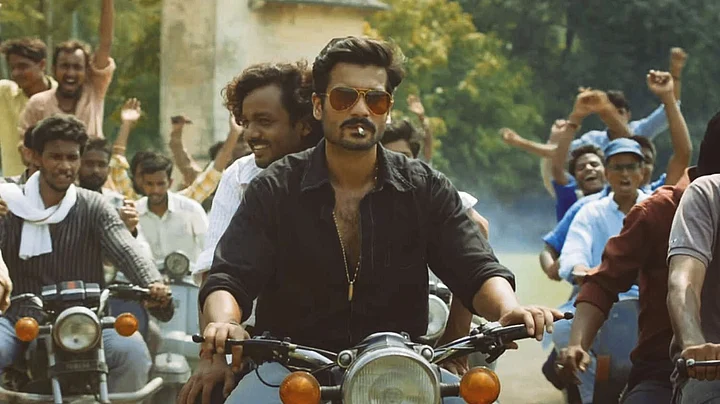Much has been said about the latest movie Hurdang, which ventures into the ultra-sensitive issue of Mandal politics. While most of the online reviews quickly descend into a somewhat mendacious, unintellectual takedown of the movie (since the film, too, is a somewhat unsubtle and perhaps crude rejection of some of the issues that led to the Mandal model of affirmative action), unfortunately, what none of the articles or critiques have dared to attempt is a logical un-layering of the complex issue of caste-based reservations and the sociopolitical ramifications of it.
Whether the movie is cinematically good is a mundane question when the issue at hand is so complicated and yet so important. What Nikhil Bhat must be credited for is at least trying to venture into it. That any movie on affirmative action is bound to ruffle feathers of one polar opposite or the other is a given. But perhaps for a lot of writers, the real purpose behind such a movie might not be just to produce cinematic gold dust but also to trigger an intellectual debate on a topic that, in itself, has unfortunately come to be considered a somewhat ‘untouchable’ debate.
As anyone believing in even an iota of democracy would agree, the purpose of any kind of affirmative action wasn’t, certainly, to render topics beyond debate.
The Issue Has Been Subverted for Political Mileage
Therefore, without getting into the cinematic merits of the movie, let us try to decipher the nuances and attempt to un-layer the politics around it. What is important to understand is that notwithstanding the somewhat logical restrictions on the Right to Equality, reservation, as envisaged by the founders of our Constitution, was basically in the context of then-prevalent unfair and unacceptable societal norms. It was proposed as a way of social upliftment and for ending caste-based social barriers, as well as for the creation of an egalitarian society. In no way did it intend to be a tool for the creation of dominant subclasses within the otherwise legislatively defined ‘oppressed classes’, which it has ended up doing.
It is, of course, a given that for many centuries, the SC/ST classes and other oppressed castes faced brutal treatment that left an indelible handicap on their future generations in terms of equality of opportunities in the true spirit of Article 14. However, what the Mandal Commission also did was give a socio-economic and political subcontext to the issue by expanding the scope of the definition of ‘Other Backward Castes’ (OBCs), which has subsequently been subverted for blatant political mileage.
Has Post-Mandal Politics Been Successful?
The three decades of post-Mandal politics have established beyond doubt that attaining social upliftment and a casteless society via the current system is as much a fantasy as that of seeing an NCR with an AQI of zero. To completely accept Mandalisation in its current, somewhat convoluted form would be akin to banning everything British for the next 200 years for what their past generations did in the previous 200.
Merits or demerits aside, the politics, especially around post-Mandal reservations, has ensured that even locally dominant or affluent caste groups such as Jats, Patidars or Marathas vociferously demand to be included in the list of OBCs primarily for the benefits of seeking reservations in jobs, which was otherwise unthinkable by any stretch of logical justification. This is primarily not due to the reservations at the undergraduate level in government colleges, which would ensure access to quality education to all sections of society, and, therefore, a level playing field for all, but because of the flat reservations extending to all possible levels of not only education but also employment and even promotions.
There Should Be a Fine Balance Between Reservation and Merit
It is crucial to understand that due to inherent political objectives behind it, more than yeoman service towards the upliftment of the actually oppressed, the Mandal Commission has gifted to the country political diamonds such as Lalu Prasad Yadav, Mulayam Singh Yadav, and their distinguished ilk on one hand and brain drain on the other.
It, therefore, must not be ignored that for any affirmative action to produce the best results, a fine balance between such a policy and incentivising merit must be maintained, along with a genuine intention behind using it as a tool of real social upliftment.
Therefore, what could have perhaps produced a better result would have been gradually reducing the share of reservations from undergraduate to postgraduate to higher levels, which would also slowly increase the degree of competition between these segments internally as well as remove the internal slabs between various groups.
It is perhaps with this logic that the Economically Weaker Section (EWS)-based quota was also introduced, though its implementation in certain spheres may be debated by some.
It is also not a secret that caste-based politics is one of the strongest tools for certain political players. Thus any debate on this topic – which is otherwise crucial for any open, inclusive and democratic society – is bound to be demonised by those with vested interests.
Overall, the best outcome of the movie would be to induce self-reflection within all individuals about the social ills that have led to caste-based oppression. But at the same time, it should also lead to a debate on what can be the most logical and intelligent way of affirmative action to rid society of the menace of caste.
(Dr Saurabh Sachchar is a Consultant Radiologist. He tweets at @dr_sachar. This is an opinion piece and the views expressed above are the author’s own. The Quint neither endorses nor is responsible for the same.)
